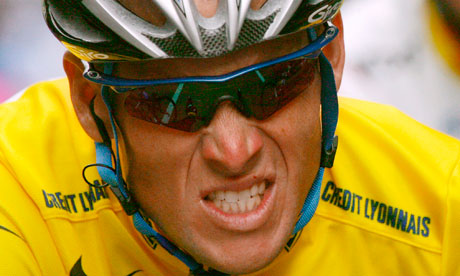Sports Saturday
It was an inspiring story that drew millions of Americans to watch a sport that most were barely aware of. When Lance Armstrong battled back from testicular cancer to win the Tour de France a record seven consecutive times, suddenly we found ourselves glued to our workday computers for every twist and turn of his mountain races. He was an inspiration for those with cancer, and he raised millions for charity.
So why would I suddenly be comparing him to Kurtz in Joseph Conrad’s Heart of Darkness\?
Actually, I originally considered Bernard Malamud’s The Natural when I heard the news that Armstrong had definitively been exposed as having doped his blood, at least for his final two Tour de France victories. (As Michael Specter of The New Yorker explains the effect, doping allows one to drive eighty miles an hour on a highway while everyone else is limited to 65.) “Say it ain’t so, Roy,” says the young boy at the novel’s end, echoing the disillusioned fan’s cry to Shoeless Joe Jackson in the 1919 “Black” Sox scandal. But I’ve already turned to the story of Roy Hobbs’ rise and fall a couple of times in the past, first with regard to slugger Mark McGwire and then to golfer Tiger Woods. Besides, Armstrong is guilty of a darker crime than McGwire and Woods and so requires a darker novel.
After all, McGwire is far from the only baseball player to have taken steroids and Woods is one of a vast number of athletes who have cheated on their wives. According to the United States Anti-Doping Agency, however, Armstrong wasn’t a lone cheat but (in the words of the New York Times) “centrally involved in a sprawling, sophisticated doping program.”
Although claiming that he was “the most tested athlete ever,” Armstrong apparently established an elaborate system, in collaboration with teammates, of avoid authorities who wanted to test him at inconvenient times. Eleven of these teammates have now testified about Armstrong to the Anti-Doping Agency, which calls his operation “the most sophisticated, professionalized and successful doping program the sport has ever seen.”
In his New Yorker article, Specter writes,
Some readers will have followed my evolution from gullible fanboy to surprised reader to angry man.
Now I am simply amazed. If you believe the mountain of documents released on Wednesday by the United States Anti-Doping Agency (and I can find no reason not to) Armstrong didn’t just dope: he was the king—better at doping than he was at pretending to win bicycle races through grit and determination.
This takes Armstrong into Kurtz territory. When Marlow first hears about the wildly successful ivory trader, he figures he must be an extraordinary man. All the reports about Kurtz are over-the-top laudatory, and Marlow is determined to meet him, especially when he witnesses the greed, corruption, and unspeakable brutality of the other white traders in the Congo. The high-minded Kurtz, he figures, will restore his belief in colonialism’s civilizing mission.
Marlow becomes disillusioned, however, when he discovers what Kurtz is really up to. Kurtz isn’t the paragon he imagined. Indeed, he has constructed an entire world of his own, a private kingdom where he engages in horrific acts (we’re never told exactly what they are) to control the native population and pile up vast stores of ivory.
Armstrong, of course, has not beheaded his enemies and put their heads on posts, as Kurtz does. But he has through the years filed defamation lawsuits against anyone who threatened to reveal what was actually going on..
Ultimately Marlow finds a way to admire Kurtz anyway, offering the somewhat weak defense, “at least Kurtz was capable of lacerating self judgment when he was on his deathbed, which is more than can be said of the other bozos around here, including myself” (I paraphrase loosely). Unfortunately, Armstrong appears incapable to any Kurtzian self-reflection, at least so far. Instead, he proved a coward as he dodged the inquest, even while proclaiming his innocence.
“The horror, the horror,” may be too strong a summing up of a cheating athlete. Armstrong was still pretty bad, though.


